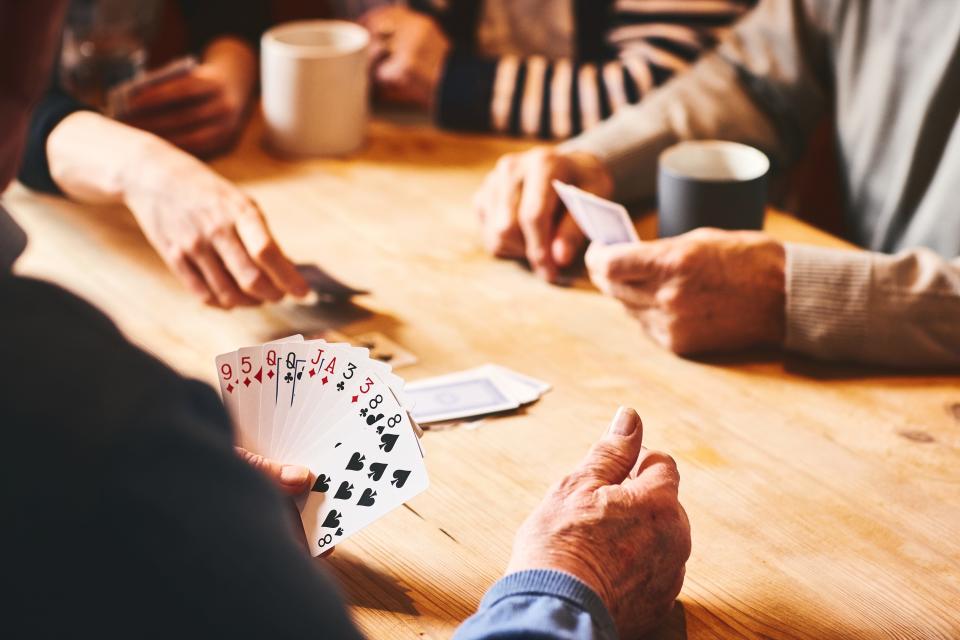Fact check: Origin stories for popular phrases are nothing more than urban legends
Claim: A list claims of common idioms have various origins
The last several months have left many wondering: Where did 2020 come from? While we can't answer that, a Sept. 9 Facebook post is attempting to find meaning in the unknown, by explaining the origins of several everyday phrases, words and symbols.
USA TODAY took a look at each claim on the list and found most of these are nothing more than unproven urban legends.
The Facebook user that posted the list has yet to return USA TODAY's request for comment.
More: Fact-checking 2016: Trump dominates annual review of political falsehoods
1. "In the 1400s a law was set forth in England that a man was allowed to beat his wife with a stick no thicker than his thumb. Hence we have 'the rule of thumb.' "
In April 1998, the Baltimore Sun investigated the etymology of "rule of thumb" and found no clear evidence that the domestic abuse story was true. The Sun suggested the phrase could have come from brewers' practice of using their thumb to test the temperature of beer.
“Despite the phrase being in common use since the 17th century and appearing many thousands of times in print, there are no printed records that associate it with domestic violence until the 1970s, when the notion was castigated by feminists,” explained website the Phrase Finder.
Both the Sun and the Phrase Finder acknowledged a story in which a judge supposedly told a man he could beat his wife with a stick so long as it was thinner than his thumb. Allegedly, Judge Sir Francis Buller’s 1782 decision inspired cartoonist James Gillray to publish a satirical illustration the following year, which dubbed him "Judge Thumb."
More: Fact check: Trump could have been exposed to COVID-19 before Sept. 29 presidential debate
However, there is no evidence Buller ever made this decision. “(N)o substantial evidence has been found that he ever expressed so ungallant an opinion,” Edward Foss wrote in "The Judges of England" after investigating the claim in 1870.
“(F)igures of speech can work much the same way that urban legends do: They may appear mysteriously, spread spontaneously and contain elements of humor or horror. And, like urban legends, a figure of speech may contain a grain of emotional, if not actual, truth,” wrote the Sun.
Both sources concluded the term is more likely to derive from a thumb’s use for general measurements (distance, alignment, temperature, etc.) than the domestic violence legend.
More: Fact check: Some of viral post's facts that 'stand up for the Golden State' lack context
2. "Many years ago in Scotland, a new game was invented. It was ruled 'Gentlemen Only, Ladies Forbidden' ... and thus the word GOLF entered into the English language."
The first documented use of the word "golf" was on March 6, 1457, in Edinburgh by King James II. Several sources confirm golf cannot be an acronym because the word was used in different variations before there was a standardized spelling.

According to the USGA, "golf" is not an acronym but a Scottish adaptation from the Dutch word "kolf" or "kolve," which meant "club" and was a Dutch game played with a ball and a stick. USGA notes that the Scots adapted the term to "goff" or "gouff" in the 14th and 15th centuries until it ultimately became "golf" in the 16th century.
Scottish Golf History suggests the term may have, “derived from Scots words 'golf,' 'golfand' and 'golfing,' which mean 'to strike' as in 'to cuff' or 'to drive forward with violence.'"
3. "Each king in a deck of playing cards represents a great king from history: Spades - King David, Hearts - Charlemagne, Clubs - Alexander the Great, Diamonds - Julius Caesar"
Snopes debunked this claim in 2007, concluding that although the kings on cards had assigned specific kings and queens for a period between the 15th and 18th centuries, the practice was never standardized. Modern playing cards no longer represent specific royals.
The Atlantic noted that British and French decks of playing cards do tend to feature the same four kings, Charles, David, Caesar and Alexander the Great.

4. "In Shakespeare's time, mattresses were secured on bed frames by ropes... Hence the phrase... 'goodnight, sleep tight.'"
Indiana University's Wylie House Museum debunked this myth in 2018. Wylie House noted that the first documented use of the phrase “sleep tight” wasn’t until 1866, centuries after rope beds were invented in the 16th century. The phrase's late origins indicate it was not in reference to rope bed frames.
Wylie House noted that the word "tight" was often associated with safety or comfort, like many people colloquially say they are "tight" with a friend or family member. "Sleep tight" more likely references wishing someone a good night’s sleep than a rope bed frame.
More: Fact check: Trump sticks with bogus voter fraud claims
The Phrase Finder investigated the claim and also concluded it had more to do with the meaning of the word tight than the furniture.
5. "It was the accepted practice in Babylon 4,000 years ago that for a month after the wedding, the bride's father would supply his son-in-law with all the mead he could drink ... this period was called the honey month, which we know today as the honeymoon."
Country Living and Insider both took a look at the claim and found there is more to the story.
There are several theories about origins of the term "honeymoon." According to a 2016 Country Living article, couples did drink honey-based alcohol on the “moon” after their wedding throughout history. Wedding guests often gifted the couple “mead” in hopes of an early pregnancy since the alcoholic beverage was believed to be an aphrodisiac.
Dictionary.com states that “honeymoon” references customs of giving newlyweds mead to last through the sweet period after the wedding.
"The word may come from the Nordic word ‘hjunottsmanathr.’ This refers to when the groom would actually kidnap his bride and hide her until her family stopped looking for her," wedding trend expert Kim Forrest told Country Living.
Oxford English Dictionary traced early use of the word to British writer Robert Greene before his death in 1592. Greene uses the word “honney moon” to describe the sweet (like honey) short period of time (like a month or lunar cycle) after a marriage.
More: Fact check: Chris Wallace visited George Clooney in Italy, not Jeffrey Epstein's island
“Hony mone, a term proverbially applied to such as be newly married, which will not fall out at the first, but th'one loveth the other at the beginning exceedingly, the likelihood of their exceeding love appearing to aswage, ye which time the vulgar people call the hony mone,” wrote 16th century author Richard Huloet.
Insider reports honeymoons didn’t refer to vacations until 1791.
6. "In old England, when customers became unruly, the bartender would yell at them 'Mind your pints and quarts, and settle down.' It's where we get the phrase 'mind your Ps and Qs'."
Snopes found similar claims that "mind your Ps and Qs" came from bartenders telling patrons to "mind their pints and quarts" to be false in 2010. The term, which was first recorded on 1756, has several possible origin stories.

Business Insider investigated the phrase's origin in 2015 and concluded there was no evidence to support the urban legend. The article referred to several versions of the phrase used during the 17th century in a singular rather than plural context to debunk the "pints and quarts" theory.
7. "Many years ago in England, pub frequenters had a whistle baked into the rim or handle of their ceramic cups. When they needed a refill, they used the whistle to get some service. 'Wet your whistle' is the phrase inspired by this practice."
Whistle has been a metaphor for mouths since the 14th century because it is an instrument for noise. “(W)histle logically calls for wet — similarly, the mouthpiece of a musical instrument sometimes needs to be wetted,” Merriam-Webster explains.
According to Merriam-Webster, the term came to reference drinking, especially alcohol, over time.
More: Fact check: Joe Biden faces friendly fire – partly false – over age, pot, prisons and more
8. "In 1696, William III of England introduced a property tax that required those living in houses with more than six windows to pay a levy. In order to avoid the tax, house owners would brick up all windows except six... As the bricked-up windows prevented some rooms from receiving any sunlight, the tax was referred to as 'daylight robbery'!"
Although William III of England did enact a Window Tax that inspired some taxpayers to brick up their windows, the Phrase Finder states the tax is unrelated to the term because the phrase isn’t documented until 1916.
In 1916, Harold Brighouse’s comic play, "Hobson’s Choice," used the term in a context outside the Window Tax.
“So, if the phrase came from the Window Tax, why no mention of it in print for over two hundred years after the tax was introduced?” asked the Phrase Finder. “Unless and until evidence that relates the phrase to the tax is found we have to say that the origin is unknown.”
More: Fact check: Girl pictured with Barack Obama in viral posts is his niece
Idiom Origins agrees the Window Tax myth is a hoax. “Daylight robbery is simply what is suggested by the phrase, a robbery that takes place in broad daylight; hence its figurative meaning as a blatant over-charging for goods or services,” Idiom Origins concludes.
Our ruling: False
Several stories that explain the etymology of common phrases, terms and symbols are nothing more than urban legends. Investigations into each origin story over a number of years show that although pieces of each stories could be true, there is not enough evidence to support any claim entirely. We rate these origin stories FALSE.
Our fact-check sources:
The Baltimore Sun, April 17, 1998, "The misunderstood 'rule of thumb' Misconception: Many feminists for years thought the phrase "rule of thumb" referred to British common law's tolerance of wife-beating."
The Phrase Finder, "The meaning and origin of the expression: Rule of thumb"
Scottish Golf History, "Golf - Meaning of Word Golf"
Snopes, Sept. 29, 2007, "Four Kings in Deck of Cards"
The Atlantic, Aug. 24, 2017, "The Lost Origins of Playing-Card Symbols"
Indiana University Bloomington, Wylie House News and Notes, Jan. 18, 2018, "Sleep Tight, Don’t Let the Bed Bugs Bite – A Myth Debunked"
The Phrase Finder, "The meaning and origin of the expression: Sleep tight"
Country Living, June 22, 2016, "This Is the Real Reason We Go on Honeymoons"
Insider, Mar. 27, 2017, "The mysterious origin of the word 'honeymoon'"
Dictionary.com, "The Surprising Meaning Of Honeymoon Explained"
Oxford English Dictionary, "honeymoon, n."
Text Creation Partnership, 1592, "Greenes vision vvritten at the instant of his death. Conteyning a penitent passion for the folly of his pen."
Snopes, June 13, 2010, "Etymology of ‘Mind your P’s and Q’s.’"
Business Insider, June 20, 2015, "Where the phrase 'mind your P's and Q's' comes from"
Merriam-Webster, "Is It 'Whet' Or 'Wet' Your Appetite/Whistle?"
The Phrase Finder, "The meaning and origin of the expression: Daylight robbery"
Idiom Origins, "Origin of: Daylight robbery"
Thank you for supporting our journalism. You can subscribe to our print edition, ad-free app or electronic newspaper replica here.
Our fact check work is supported in part by a grant from Facebook.
This article originally appeared on USA TODAY: Fact check: Origin stories for popular phrases are urban legends

